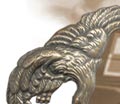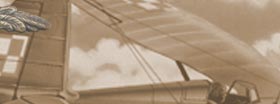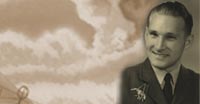Translation of Article in The Polish Daily: 11/9/03
BRITISH GOVERNMENT APOLOGISES FOR V-DAY PARADE
WITHOUT THE POLES.
A DEBT TO PARENTS REPAID
It has finally happened: the British Government has officially expressed regret for not inviting Polish Combatants for the famous V-Day parade in 1946.
Who convinced Tony Blair to make such a gesture? One man, motivated by desire to compensate the harm done to the generation of his parents.
To achieve justice, he approached the British Government and wrote to Tony Blair. He replied. “He very much regrets” sounds the mea culpa of
Downing Street.
On 9th February 2001, the premiere of the documentary film – The Forgotten Odyssey – by Jagna Wright and Aneta Nasyinska, took place at the
Imperial War Museum. Among the audience were government employees, combatants, emigrants and young, second generation Poles.
After the film members of the audience expressed their opinion. Among them, is an ex-combatants’s touching recollection of how he witnessed from a
street corner the triumphant parade of the allied forces. He had tears in his eyes. He saw soldiers of all nations and races. There were no Poles,
no airmen, no armoured forces members. The Londoners were full of joy. The whole world and the British were taking part. All except soldiers with
white and red colours who seemed to have won the war, but really had lost it. And after everything, having lost their country, this humiliation. Under the
pressure from Moscow the Labour Government of the day agreed to exclude Poles from the Parade. Why should they proudly walk the streets of
London and upset the Soviet ambassador? What was the significance of 150 thousand of Allies compared to the new world order?
A member of the audience, Michael Moszynski remembers this evening:
“I was deeply moved….there is no question…it was treachery on the British side.”
Later that evening, Michael had a discussion with his mother asking her about the Parade “how did it happen? What did my father feel about it?”
Michael decided that it was high time to ensure justice was done, and a certain thought started to germinate.
Michael only has vague memories of his father (who died in 1970, when he was 7). Stefan Moszynski was a captain in the Polish 1st Armoured
Division. Mary Moszynska, Michael’s English mother, did not let the memory of his father and his family fade away. The family tradition was unusual.
Stefan’s cousin, Major Adam Moszynski was the author of the “List of Katyn” naming 10,000 Polish officers lost in the Soviet Union. Stefan’s brother,
Tadeuz was a ‘tail-end Charlie’ in a Wellington bomber, who was shot down over Germany. Imprisoned there he took part in the famous
“Great Escape”.
I met Michael in the heart of Soho in the splendid office interior of M&C Saatchi advertising agency, of which he is a partner. I was trying to catch up
with him for weeks, as he is a very busy man. The first time I had an appointment with him I was informed by his secretary that he had to go to
Nigeria. The second time it was also difficult and I was left waiting. Eventually he appeared, energetic, in his 40’s. In an apologetic way he made clear
that the subject of our discussion was more important to him than his work. Michael indicated that he was brought up in an atmosphere marked by
historical injustice done to his father’s nation. “In my heart I always remain a Pole” he admits.
Explaining his decision to join the British Army, Michael Moszynski said:
“I came to the conclusion that it was my duty to fight communism as this fight represented a chance for Poland’s liberation.”
In 1980’s he joined British Army in the Westminster Dragoons. “I felt that it was my duty to fight communism.” It was also a chance to fight for
Poland’s liberation continues Michael. At home, he remembered the significance of Yalta and the Katyn massacre. And the Parade?
THE GREAT DISHONOUR
On 22 May 2003, Fiona Millar who was then a partner to Alastair Campbell, communication director at Downing street, puts on the desk of Tony
Blair a letter from Michael Moszynski. This was one week ahead of British Premier’s visit to Warsaw where he was to deliver a speech encouraging
Poles to vote Yes in the European Referendum. Poland was at that time a subject of articles in all newspapers of Europe. President Bush was in
Cracow, Verhengen was visiting Warsaw frequently and in Iraq a Polish sector was being created.
Among thousands of Blair’s concerns, this issue did not seem to be the most important. Blair reads however, “I am writing to you today in the hope
that you may be able to correct one of the more shameful deeds of the British Government in 1945, which left a permanent scar on the reputation of
Great Britain among her most loyal Allies,” – so sounds the 1st paragraph of Moszynski’s letter.
“After all that happened to my Father’s country in those terrible years, the final insult took place during the victory Parade in London.” To our great
dishonour, the British Labour Party acquiesced to the Soviet government demand that no Polish serivcemen serving under British command should
participate in the Parade. After almost 60 years this feeling of treachery did not vanish.”
In the following paragraphs Moszynski proposes that in 2005 on the 60th anniversary of VE Day, that not only are the Polish veterans invited but also
that they should lead the Parade. “I think that this is the least Britain should do” writes Moszynski to Blair.
The letter ends referencing the motto: ”For your and our freedom”.
“Now is the time that our generation should consider what to do for those magnificent Poles who helped us to preserve our freedom, now, when at last
they have regained theirs.”
�





